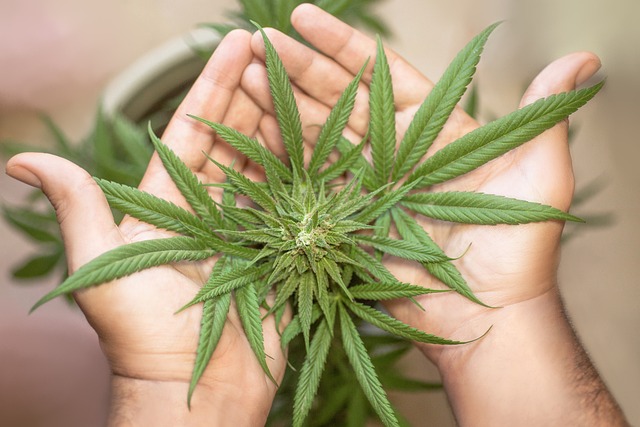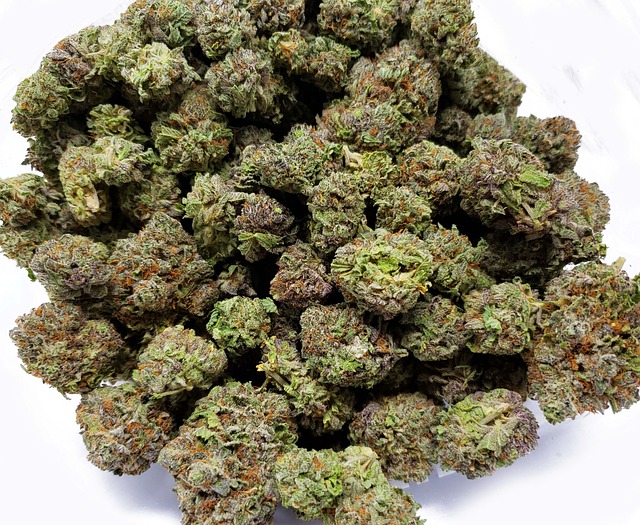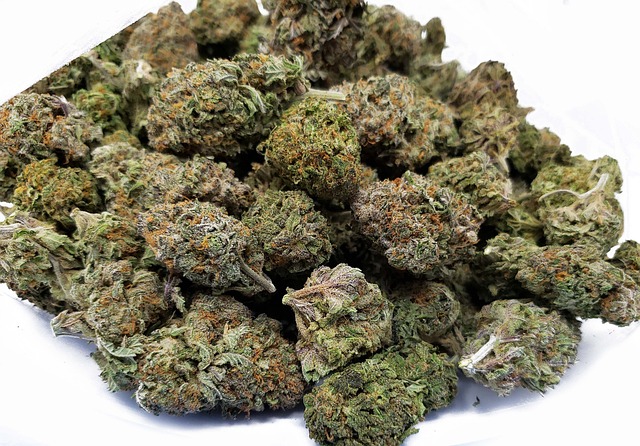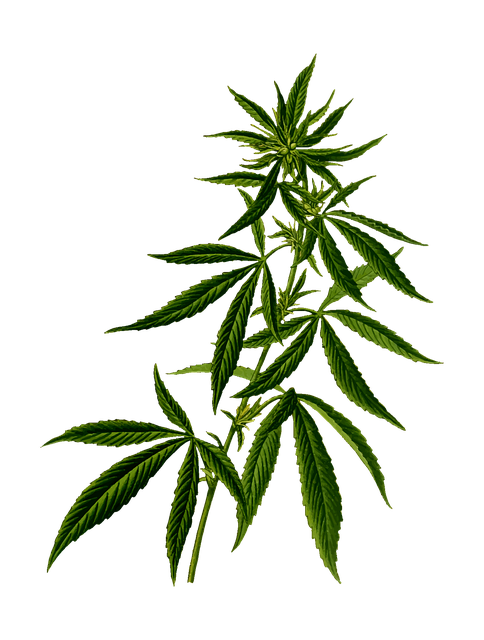The THCA flower, a non-psychoactive component of cannabis plants, is emerging as a multifaceted skincare ally, with studies suggesting it may offer anti-inflammatory and antioxidant benefits for skin health. Its unique properties could help mitigate skin irritation and protect against environmental damage, potentially leading to clearer and more vibrant skin. The THCA flower’s interaction with the endocannabinoid system is believed to be key in addressing various skin conditions like acne, eczema, and psoriasis by maintaining skin balance, improving texture and tone. As a natural ingredient in skincare, THCA flower stands out for its potential in contemporary dermatological practices due to its therapeutic effects. Users should approach its integration into their skincare routine with caution, starting with small applications to test for sensitivity, and using carrier oils to enhance absorption while minimizing irritation. Adhering to recommended dosage and avoiding ingestion will help ensure safe and effective use of THCA flower for skin care benefits.
Exploring the multifaceted benefits of THCA flower for skin care, this article delves into the various aspects of incorporating this natural compound into your skincare regimen. From its dermatological advantages to a detailed exploration of potential side effects, users will gain insight into how THCA flower can be a potent ally in maintaining and enhancing skin health. We’ll cover the science backing its efficacy, guide you through proper usage, and address interactions with other skincare ingredients and medications. Additionally, we’ll navigate legal considerations and provide expert dermatologist perspectives alongside user testimonials. This comprehensive guide aims to empower consumers with knowledge about top THCA flower role in skin care, ensuring a safe and informed approach to its application.
- Unveiling THCA Flower: A Natural Skincare Ally
- The Science Behind THCA Flower and Its Dermatological Benefits
- THCA Flower’s Role in Skin Health: An Overview
- Potential Side Effects of Using THCA Flower on Skin
- Understanding the Varieties of THCA Flower and Their Impact on Skincare
- Proper Application and Dosage for Safe THCA Flower Use in Skincare Routines
Unveiling THCA Flower: A Natural Skincare Ally

Unveiling THCA Flower as a Natural Skincare Ally, the cannabinoid THCA (Tetrahydrocannabinolic Acid) in its floral form offers promising benefits for skincare regimens. The THCA flower, rich in beneficial properties, has garnered attention within the wellness and beauty industries due to its potential to support skin health. This natural compound is found in the raw cannabis plant and is precursor to THC (Tetrahydrocannabinol), yet it holds distinct advantages when applied topically. Preliminary research suggests that THCA flower may possess anti-inflammatory and antioxidant properties, which can aid in soothing irritated skin and protecting against environmental stressors. Its application is believed to promote a clearer, more radiant complexion by targeting the root causes of various skin concerns such as acne, eczema, and psoriasis. Moreover, the THCA flower’s interaction with the body’s endocannabinoid system may contribute to maintaining the skin’s balance, leading to improved skin texture and tone. As an emerging skincare ingredient, THCA flower is set to revolutionize how we approach skincare, offering a natural alternative for those seeking effective and holistic beauty solutions.
The Science Behind THCA Flower and Its Dermatological Benefits

Delta-9-tetrahydrocannabinol acid (THCA) is the non-psychoactive precursor to the well-known compound delta-9-tetrahydrocannabinol (THC), found in the cannabis plant. THCA is gaining attention for its potential therapeutic properties, particularly within the realm of dermatology. Scientific research indicates that THCA interacts with the body’s endocannabinoid system, which plays a significant role in maintaining skin health and homeostasis. This interaction may contribute to anti-inflammatory, antibacterial, and antioxidant effects, making THCA flower a compelling subject of study for skincare applications.
Incorporating THCA flower into skincare routines is predicated on these scientific findings. Topical applications rich in THCA have been explored for their potential to soothe various skin conditions, such as eczema and psoriasis, due to its anti-inflammatory properties. Furthermore, the antioxidant nature of THCA may protect the skin against oxidative stress caused by environmental factors like pollution and UV radiation, which can lead to premature aging. The use of THCA flower for skin care is an emerging field with promising results, suggesting that this natural compound could become a valuable asset in dermatological practices and personal skincare regimens.
THCA Flower’s Role in Skin Health: An Overview

Delta-9 tetrahydrocannabinolic acid (THCA) is the non-psychoactive precursor to the well-known psychoactive cannabinoid, delta-9 THC. Found abundantly in raw cannabis flowers, THCA flower has garnered attention for its potential benefits, particularly in the realm of skin care. Preliminary research suggests that THCA may offer protective and therapeutic effects on the skin. Its interaction with the body’s endocannabinoid system could play a role in regulating sebum production, which is crucial for maintaining healthy skin. This regulation can be beneficial for individuals experiencing acne or other skin-related conditions sensitive to sebum levels. Additionally, THCA is believed to possess anti-inflammatory properties, which can help soothe inflamed skin and reduce redness and swelling. Its antioxidant qualities may also aid in neutralizing free radicals, a process that can help prevent signs of aging such as fine lines and wrinkles. Incorporating THCA flower into skincare routines may provide a natural approach to achieving and maintaining healthy skin, although further scientific research is necessary to fully understand the extent of its effects and benefits. Users interested in exploring THCA flower for skin care should consider consulting with a healthcare professional to discuss potential interactions with other medications or conditions.
Potential Side Effects of Using THCA Flower on Skin

1. Incorporating THCA flower into skincare routines has garnered attention due to its potential benefits, which may include soothing properties and antioxidant effects. However, as with any new addition to one’s beauty regimen, it is prudent to be aware of the potential side effects associated with its topical use. Users may experience mild skin irritation or sensitivity upon initial application, which typically subsides as the skin adjusts. It is also important to note that while THCA flower is often touted for its non-psychoactive status when applied topically, individuals with a sensitivity to cannabinoids or those prone to allergic reactions should exercise caution and consider a patch test before broader application. The concentration of THCA in the product and the frequency of use can influence how one’s skin reacts; thus, moderation and observance of one’s skin’s response are key.
2. When exploring the realm of THCA flower for skincare, it is essential to approach its use with an informed perspective. Unlike its psychoactive counterpart THC, THCA is non-intoxicating and has been found in studies to exhibit anti-inflammatory properties that may be beneficial for various skin concerns. Nonetheless, it is not without its considerations; some individuals might experience dryness or oiliness as their skin acclimates to the new substance. Additionally, those with particularly sensitive skin or pre-existing skin conditions should consult with a healthcare professional before incorporating THCA flower into their skincare regimen. The aim is to harness the potential benefits of THCA while minimizing any adverse effects, ensuring that skin care remains a positive and nurturing experience.
Understanding the Varieties of THCA Flower and Their Impact on Skincare

The THCA flower, which stands for tetrahydrocannabinolic acid, is a non-psychoactive compound found in cannabis plants that has garnered attention for its potential therapeutic properties and its impact on skincare regimens. Unlike its psychoactive counterpart, THC, THCA exists naturally in hemp and many cannabis strains and possesses a unique profile of beneficial compounds. As researchers continue to explore the efficacy of cannabinoids in skincare, THCA flower for skin care has emerged as a subject of interest due to its rich cannabinoid and terpene content.
Several varieties of THCA flower are cultivated, each with distinct terpene profiles that may influence their effects on the skin. For instance, the Sativa-dominant varieties are often associated with invigorating and uplifting properties, which may translate to skincare products that promote a brightening and rejuvenating effect on the skin. Conversely, Indica-dominant strains are known for their calming and relaxing effects, potentially making them suitable for formulations aimed at soothing and balancing the skin. The antioxidant properties found in THCA are believed to aid in protecting the skin from environmental stressors while promoting a healthy complexion. Additionally, the anti-inflammatory attributes of THCA can be beneficial for addressing skin irritations and conditions such as eczema or psoriasis. When incorporating THCA flower into skincare routines, it is essential to consider the specific varieties and their unique characteristics to maximize the intended skincare benefits.
Proper Application and Dosage for Safe THCA Flower Use in Skincare Routines

Integrating THCA flower into a skincare routine can be a beneficial addition for those seeking its potential benefits, but it’s crucial to approach its application with care and precision. The proper application of THCA flower for skin care involves starting with a low dose to assess individual skin sensitivity and tolerance. Users should begin by applying a small amount of THCA flower topically to a targeted area of the skin, observing any reactions over a period of time before expanding use. THCA flower, in its raw form, can be infused into carrier oils or lotions, which help to distribute the cannabinoid evenly across the skin and enhance absorption. Carrier oils like coconut or jojoba oil are excellent for this purpose as they mimic the skin’s natural sebum and can improve the THCA flower’s efficacy without causing irritation.
When incorporating THCA flower into a skincare regimen, it’s important to adhere to dosage guidelines to prevent overuse, which could potentially lead to negative side effects. A common recommendation is to apply the product sparingly, once or twice daily, depending on the individual’s skin type and condition being treated. It’s also advisable to apply THCA flower topically rather than ingesting it, as its effects are primarily localized when applied directly to the skin. For those with particularly sensitive skin, a patch test is recommended before full application to ensure there are no adverse reactions. By following these guidelines for proper dosage and application, users can enjoy the potential benefits of THCA flower in their skincare routines safely and effectively.
In conclusion, the exploration of THCA flower’s role in skincare has revealed a promising natural ally for maintaining and improving skin health. Its dermatological benefits are rooted in scientific evidence, suggesting its potential as a beneficial addition to skincare regimens. However, it is crucial for consumers to approach THCA flower use with careful consideration, particularly regarding its application and dosage to avoid any adverse effects. While THCA flower can be a valuable component for skin care, understanding the different varieties and how they interact with individual skin types is essential for optimizing benefits and ensuring safety. Prospective users should consult with healthcare professionals when integrating THCA flower into their skincare routines to ensure the best possible outcomes for their skin health.
